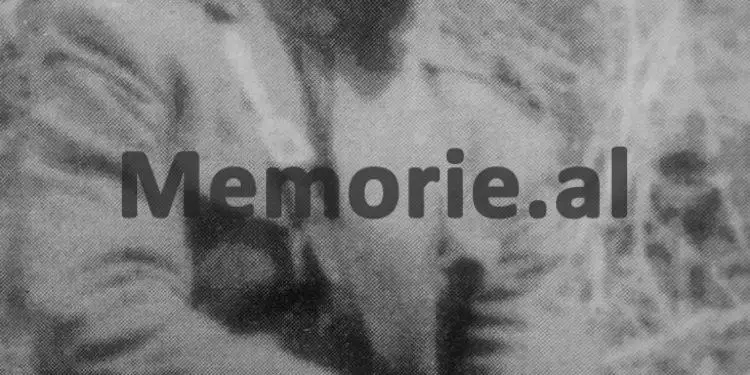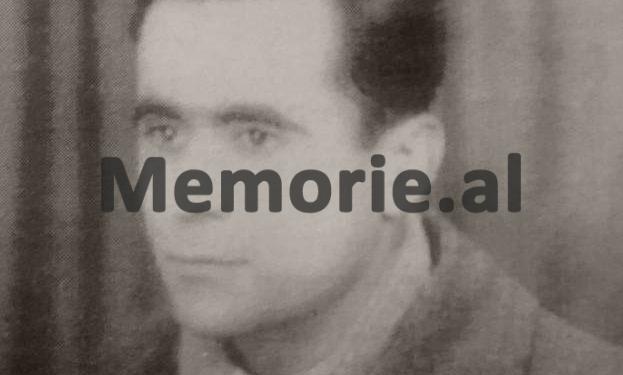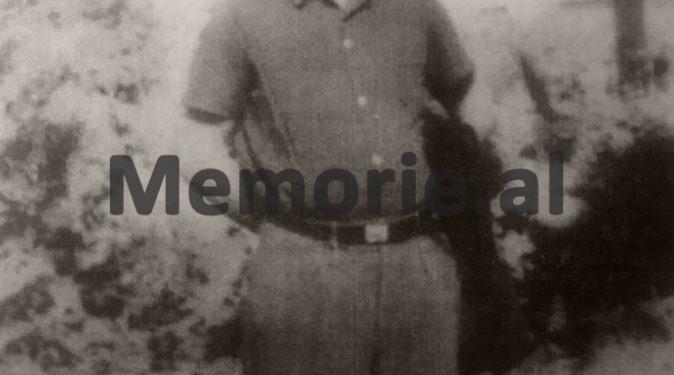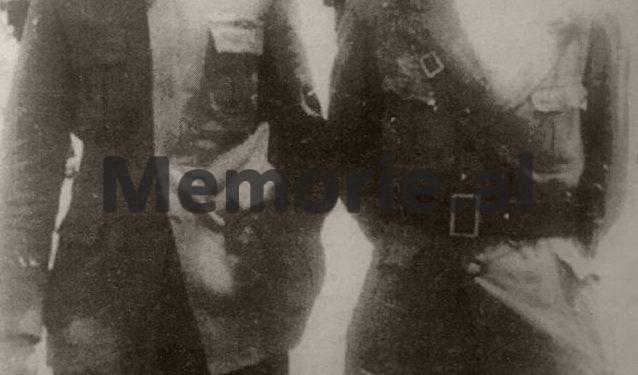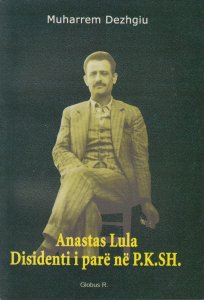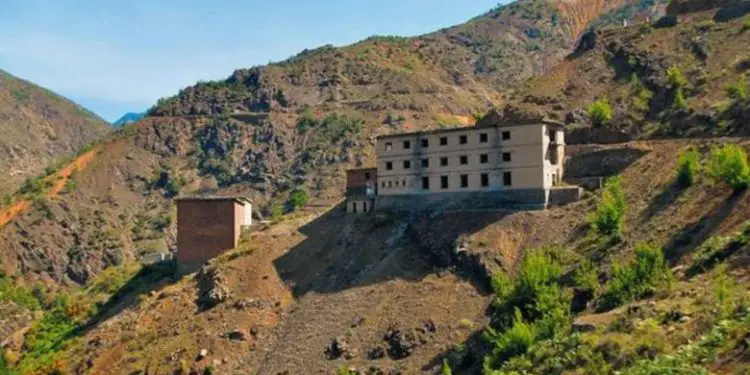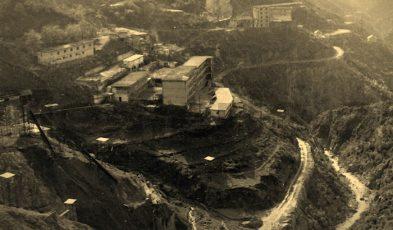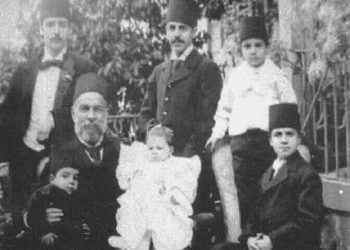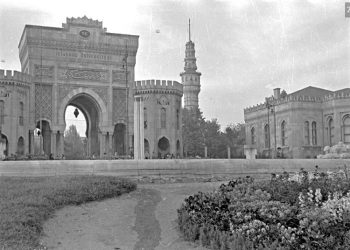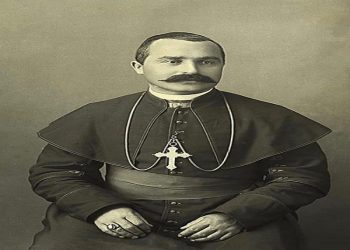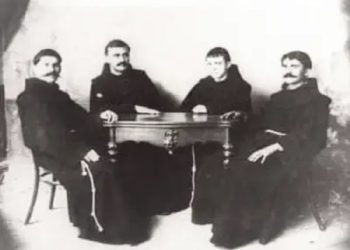Dashnor Kaloçi
Memorie.al publishes the unknown story of Sarandi Lula, originally from the village of Shala in Kolonja, whose brother, Anastasi, former Chairman of the Communist Youth Group and member of the founding meeting of the Albanian Communist Party on November 8, ’41, with ordered by Enver Hoxha, was executed in 1943 in Gllava of Tepelena, by a partisan unit led by Ramiz Aranitasi and Orhan Frashëri. Sarand’s engagement in the Anti-Fascist Movement during the War, where after participating in the guerrilla units of the city of Korça, he volunteered to join the partisan forces, first with the “Revenge” Battalion commanded by Petrit Dume and then in the IX Brigade -to Offensive. Sarandi went to study in the military schools of the Soviet Union, from where after some time he sought to leave and returned to his homeland, where he was sentenced four times to political prison, dying at the Tirana Prison Hospital in May 1986…
“For several years in a row, the defendant Sarandi Lula, has agitated and propagandized against the popular power, saying that: ‘in this power he does not live, where the worker works hard and receives very little, 30 lek per day. The mistakes that were made in the Hungarian party were also made in our party ‘. He talked about the outbreak of a Third World War, which would end, in favor of the Anglo-Americans, because the Capitalist camp is stronger than the Socialist camp. He presented the Warsaw Pact as a treaty of war and not of peace. He presented the peace policy of the Soviet Union as a war-peace policy. He has been waiting for the changes of the situation in our country from an external intervention “. This was stated, among other things, in the indictment against the defendant, Sarandi Lula, formulated by the investigator Llambi Jegeni and approved by the Deputy Director of Internal Affairs of the District, Muço Saliu, in August 1957. This was Sarandi’s second sentence, after he was convicted and re-convicted two more times, suffering in the horrible galleries of Spaç, from where he contracted a lung disease and died at the Tirana Prison Hospital in 1986. For more about the history of his life, we will be known in this article that Memorie.al has prepared based on the testimonies of his brother, Dhimitarq (Taqo), Lulo, a teacher by profession, and after the ’90s, former chairman Of the Democratic Party of the district of Kolonjë.
Who was Sarandi Lulo?
Sarandi Lulu was born in the village of Shala in Kolonjë in 1925, and he was the fifth child of Refail Lulo and was about ten years apart from his older brother, Anastasios. After finishing primary school in Erseka, he came to Tirana and attended the American Technical School of Fultz, but after the start of the Italo-Greek war in 1940, he was forced to stop it and returned to Korça to continue there. lessons at the City Lyceum. In October 1942, influenced by his brother Anastasi, who had left Korça for Tirana and was one of the first exponents of the communist movement (Chairman of the Communist Youth Group), Sarandi volunteered in the partisan ranks in Erseka’s gang. A few months after the formation of the Communist Party, he was accepted as a member and was part of the communist cell of the “River” neighborhood of the city of Korca. In May 1943, Sarandi was expelled from the ranks of the National Liberation Movement, because a few months ago, a partisan unit of the gang where Commissar Ramiz Aranitasi was (led by Orhan Frashëri), according to the order given personally by Enver Hoxha, executed by shooting in Glava of Tepelena, his brother Anastas. Two months later, in June of that year, Sarandi was again admitted to the ranks of the movement, on the pretext that the news of Anastas’s murder by the partisans was not true. After returning to the communist movement, he was assigned and operated in the guerrilla unit of “Korça Beer”. In August 1944, Sarandi was transferred to the “Revenge” battalion, commanded by Petri Dume, initially appointing him as the youth officer of that partisan unit. The Sarand family (the whole Lula family), at this time had moved from Erseka to the city of Korça, after their house was burned by the invaders as a partisan base. After the end of the War, in February 1946, Sarandi passed to the position of youth officer of the IX Partisan Brigade where he served until June of the same year, when he was assigned to continue his higher military studies in the Union. Soviet.
Sarandi, student in the Soviet Union
On June 13, 1946, Sarandi, along with several other former partisan comrades aboard an old Russian ship, traveled to the Soviet Union to continue his military education there as an officer. On July 7, he arrived in Lager Nikolayevsky and after a month and a half of school, transferred to the Crimean city of Simferopol, and in February 1947, he was transferred to the Odessa military school. Since they were in Saratov, Sarandi and his comrades’ cadets of the same company, expressed the first dissatisfaction with the ill-treatment given to them by the school authorities, as in the norm of food, clothing and other rights enjoyed by other officers, Russian and Yugoslav. Due to the very harsh climate with temperatures that for the most part was below zero, many of the Albanian students ended up in hospitals and one of them was Sarandi, who during his time in the city of Sinterpull fell ill with a cold. severe that also showed weakness in the heart. Seeing the difficult conditions in which they were, Sarandi, talk to his friends, such as: Petro Lubonja, Agim Zajmi, Pilo Vorfin and Avni Protopapa and they protested in the school command, refusing to wear the uniform with Russian spalls, saying they were Albanian military. After that, Sarandi was forced and made a request for the termination of studies, citing health reasons as a pretext and waiting for the response of the Albanian military mission in Moscow.
Sarand incident with Russian military and expulsion from school
On June 2, 1947, Sarandi, became the protagonist of an incident with some Russian soldiers, who were beating the Albanian student, Lieutenant Pilo Varfin and wanted to take him by force to the isolation room. At this time, Sarandi and his friend Avni Protopapa, intervened to calmly resolve the dispute, asking the Russian lieutenant, Derzdov, to enforce the regulation, which he not only did not intervene to enforce, but began to strike himself. Pilo Varfin. Then, in a fit of rage, Sarandi hit Lieutenant Derzdov three or four times, and the students, Guçe Stropani and Shaban Reçi, immediately came to his aid. That event between the Russians and the Albanians, caused a great commotion in the school, so much so that it forced its commander, Major General Pjerushini, to come and communicate to them the measures of punishment, which were from ten to twenty days in prison, for both the Russians and the Albanians who were implicated in that event. After the Albanian military mission in Moscow was informed about that event, Colonel Gjin Marku came to the school, who communicated to Sarandi Lulos and his two friends, Petro Lubonja and Pilo Varfi, the expulsion from school.
Enver Hoxha’s order for the degradation of Sarandi Lulo
After being expelled from school and returning to Albania, the Supreme Commander of the Armed Forces of the People’s Republic of Albania, Colonel-General Enver Hoxha, issued a degradation order, which stated: “Lieutenant Sarandi Lula, Lieutenant Pilo Varfi, Lieutenant Petro Marko Lubonja, sent for military studies in the schools of the Soviet Union, now at the disposal of the Directorate of Personnel, are degraded and released, as an invalid element of our National Army and transferred to the Supreme Military Court for prosecution, after being charged , to study in the Military Schools of the Soviet Union, have neglected their studies, have broken the orders of their superiors, spreading this spirit to other members of the group, have maintained a harsh attitude towards the Soviets, in a spirit of disunity, until they managed to beat a Soviet instructor. ” While this order was issued by Enver Hoxha, the State Security forces, the day before, had arrested the three trainees, according to the arrest warrant issued by the prosecutor of the National Army, the first captain Nevzat Haznedari. Thus, on February 16, 1947, the Council of the High Court, formed by the chairman Niko Çeta of members Nexhat Hyseni and Veledin Zeneli, in the presence of the Military Prosecutor, Nevzat Haznedari, began the trial against them, taking them as defendants. and a day later, the verdict was handed down, finding them guilty and sentencing each to three months in prison each.
August 1957, the second sentence for Sarand, with 5 years in prison
After being released from the first prison in February 1948, for almost ten years, Sarandi worked on various fronts, as a normist-accountant, being fired and returning to work several times in the district of Kolonjë, until August 28. 1957, when the Deputy Minister of Internal Affairs, Mihallaq Ziçishte and the Deputy General Prosecutor, Lieutenant Colonel Vangjel Koçani, approved the decision of the investigator of the Directorate of Internal Affairs, Lieutenant Spiro Thimo, to arrest Sarandi Lulo and the physical search of his house. his. On August 30, 1957, the investigator of the State Security Directorate, Llambi Jegeni, approved the indictment he had formulated for them to the Deputy Director of Internal Affairs of the District, Muço Saliu, which stated: “For some years in a row, the defendant Sarandi Lula, has agitated and propagandized against the popular power, saying that: ‘in this power he does not live, where the worker works hard and receives very little, 30 lek per day. The mistakes that were made in the Hungarian party were also made in our party ‘. He talked about the outbreak of a Third World War, which would end, in favor of the Anglo-Americans, because the Capitalist camp is stronger than the Socialist camp. He presented the Warsaw Pact as a treaty of war and not of peace. He presented the peace policy of the Soviet Union as a war-peace policy. He has been waiting for the changes of the situation in our country from an external intervention “. After six investigative sessions, Sarandi was forced and admitted: “I complained that he does not live on 80 lek per day. I have been left without a job several times and the authorities look at me with a bad eye. “I did not agree to the export of olive oil and the people to use peanut oil.” On September 2, 1957, before investigator Llambi Jegeni, Sarandi stated: “I did not carry out any hostile activity on purpose, I claim that I was dissatisfied. In a meeting I had with the secretary of the Party Committee, Xhoke Prifti, he told me: “I have orders from above to rest, but you are not to blame, as long as you rest”. Not having many convincing accusations to convict Sarandi, the “competent bodies” requested the extension of the investigation, on the pretext that: ‘the agitation and propaganda crime data have not been completed and fully verified’ and for this reason, other witnesses were called. si: N. Prifti, J. Berdufi, Sh. Islam etc. On January 24, 1958, the President of the Court of Korça, Ibrahim Xhuli, with two members Kristo Trajani and Vani Mileci, started the trial for the conviction of Sarandi Lulo and during the hearings they did not take into account some statements of various witnesses from Kolonja, who testified in favor of Sarandi, saying that: “They cannot be considered as circumstances to absolve him of responsibility for the crime committed, because there are cases when the enemies of power, to camouflage their hostile work, such as the defendant, appear regular In work”. The next day, this panel handed down the verdict, sentencing Sarand to five years in prison. But Sarandi did not serve his entire sentence, as on March 25, 1959, he was released from prison, after an apology was made to him, where the commander of the Prison (Unit 303), Lieutenant Colonel Beqir Bahja, wrote, among other things: “During his time in prison, he had a bad attitude, supporting unrepentant people and chanting various slogans.”
The third sentence, with 10 years in prison, he is serving in Spaç
In early 1975, shortly after the arrest of the so-called “Beqir Ballukt coup group”, the communist regime signaled ‘increasing vigilance and tightening the ranks’, which intensified the class struggle. As a result, the people who would be hit were targeted, defining the attitude that should be maintained for the “enemies of the people”! In these conditions, Sarandi Lula, is put in the center of the blow by the authorities of the local government of Kolonjë, after the ‘shadow of his brother’, shot by Enver Hoxha, followed him everywhere from behind! After that, the relevant directives were given, which stated: “The trial must take place in the presence of the municipal enterprise, of which he is a part. To organize the trial, a meeting should be held with the Director of the Enterprise and the President of the Trade Unions, a meeting should be held with the First Secretary of the District, to reveal the personality of the defendant, to be called as a witness: President of the Trade Unions of the District. This decision to work in the city, as well as in some villages such as: Taç, Starje, Selenica, Gostivisht and Leskovik ”. After the scenario for the arrest of Sarandi Lulo was fully prepared, by order from above, the relevant bodies of the district, organized and with various forms of pressure, encouraged the people to make denunciations against him. And they were not absent: Q. Tafa, A. Qose, M. Nazarko, R. Rupi and N. Dalipi, sign evidence to his detriment. Thus, on May 26, 1975, the investigator Luan Beba, decided to arrest with the approval of the General Prosecutor, Dhori Panariti, and during the search of the apartment, the novel “Doni i qetë” and “Lahuta e Malcisë” were found there. On the 28th, two days after the issuance of the arrest warrant by the Prosecution, Sarandi Lulos, he was handcuffed and in the city of Erseka, on June 18, 1975, a popular investigation was organized for his unmasking in the work collective, where he had worked in the Municipal Enterprise. For his unmasking, a presidium was appointed, which consisted of: Hodo Kodaj, Chairman of the Internal Affairs Branch, Thoma Stefa, the secretary of the Basic Organization of the Party, Thoma Duro, the director of the Municipal Enterprise, Thoma Joti and Stavri Birbo. The meeting was closed by Hodo Hodaj, who emphasized “the messages of Comrade Enver Hoxha, for the deepening of vigilance and the war waged by the enemies, Todi Lubonja, Fadil Paçrami, etc., up to Lipe Nashi”. In the investigator, Sarandi Lula, declared to the chief of investigation, Bujar Iljazi, saying: “All the processes are fabrications against me, but I do not know who fabricated this process against me. I know that I will be punished, that this is how life has hit me. I have been convicted once for agitation and propaganda against the popular power, but I say it conscientiously, it has been unfair. “Since you have the strength, act as you wish.” Sarandi confronts the investigator with seven witnesses and rejects all their testimonies as manipulated. On September 9, 1975, the Court of Cologne started the trial in charge of Sarand, which consisted of J. Ligori as President, J. Konini (Qazimi) as a member, and Vladimir Cepa as Prosecutor of the session. The Court noted that: ‘to the extent of his sentence, it had in mind the pronounced social danger of the defendant and his activity against popular power, notwithstanding his defense power and socialist economic base, aimed at undermining and weakening power popular. The defendant has been convicted and once, for the crime he is accused of, ie he is a specific recidivist, for the same crime, this shows his pronounced danger, he has in mind his negative attitude, before the trial against him, there is a place to apply the maximum of punishment. The defendant is the brother of the traitor, Anastas Lula “. Following the claim, as a conclusion, the trial panel imposed the sentence of 10 years in prison for Sarandi Lulon. Following this decision, he submitted an appeal to the President of the Court, where he said: “Comrade President, in my investigative processes, I have stated that I have been arrested as a declared person, as Anastas Lulo’s brother, hated and suspected by the authorities of dictatorship. I ask of you only justice and not mercy and I ask that the sword of justice fall on me without mercy, but never the sword of intrigue, of the counterweight opinion of my helplessness. I beg you for mercy for only one thing, unfortunately, I got married at the age of 40 and I have two minor children, please remove from the decision the seizure of part of my property, so that the child has it and eats bread, that salary of a woman does not exceed 350 lek per month”. During the trial, the prosecutor arbitrarily stopped Sarand from defending himself and demonstratively addressed him, saying: “You have nothing to say to the people, we have clarified to the people, who you are”.
Fourth sentence in Spaç prison, 20 years
In November 1975, after the Supreme Court did not consider Sarand’s appeal for innocence, he was sent to Ward 303 (Spaç Prison) to serve his sentence. At that time, Sarandi, was under 50 years old and there in that camp, he was among the oldest, both in age and in the experience of sentences, of suffering in prisons. In that prison, he met his old friends, the colonists Napolon Koleci and Tomor Koleci, who know him and another group of prisoners, such as: Xhelal Koprenca, Flamur Rusi and Pal Ndreca. Being a cultured and intellectual man and a good connoisseur of several foreign languages, Sarandi discussed with his friends about the political situation in the country and internationally. Thus, he and Xhelel Koprencë discussed the European Security Conference, Hua Kuo Fen’s visit to Yugoslavia and the breakdown of relations between China and Albania. “Now I think that no visible changes can be expected in Albania,” Sarandi told his comrades-in-arms, arguing: bring great economic difficulties and leaving Albania without economic and political support from other countries, will bring positive results for us “. One of his closest friends in that prison, Bardhosh Gjonzeneli, recalled: “When relations with China broke down, Sarandi said: Now they are left as lonely dogs and we will see how much their skin is worth.” But on February 21, 1979, when he had served his third sentence of 3 years and 10 months, he was arrested again “in the name of the people”, for the fourth time, but with a change from other times, that this time, he was shaved and had no movable or immovable property to be seized as before. Tied in handcuffs, he was sent to ‘Ward 313’ in Tirana, where after a thorough search, he was seized a white lighter made in Austria, a pair of widely used optical glasses, and a leather waistband, which was all his personal property, which he possessed at the age of 54 years.
The Prosecutor General of the Republic, Rrapi Mino, approved the arrest
The arrest of Sarandi was approved by the General Prosecutor of the Republic, Rrapi Mino and the investigator Isa Halili, formalized the accusation: “Sarandi Lula, in cooperation with other persons serving the sentence together in Unit 303 Spaç, have created an anti-socialist organization commit crimes against the state”. Along with Sarandi, 11 other people were arrested that day, such as: Xhelal Sami Koprenca, Irfan Xhevdet Vrioni, Bardhosh Bego Gjonzeneli, Eduart Llesh Marashi, Ernest Luigj Kraja, Gaspër Rrok Gaspëri, Napolon Meto Koleci, Florenc Ferik Rusi, Nuredin Vesel , Pal Zef Ndreca and Thoma Jorgji Bejo, who were considered the most dangerous people for the regime, and according to the order from ‘above’, they should be re-convicted and not come out of that prison alive. For Sarand, already tired of his age and long sentences, the sufferings, tortures and pressures of the investigators started once again, where in one of the investigative sessions, he would declare to his investigators, telling him. “Investigator, I have been charged without charge and I am being held in prison to disappear.” The investigator responds: “The investigative bodies have evidence, defendant, that you have carried out hostile activity against the People’s Power, in the Department of Education in Spaç, what do you have to tell us, defendant?” To the accusation of his investigator, Sarandi Lula, responds: “The evidence available to you, that I have developed agitation and that I am a member of such an organization, does not stand and it seems to me as if they take the boy and make him a bride”. On May 7, 1979, Sarandi Lula and 11 other accomplices appeared before the Supreme Court, composed of Sofokli Kongo, President and Met Rreli and Luftulla Ceka, members, who communicated the decision that had been predetermined., custom from above. The accusation was very serious, as Sarandi Lula and his friends were accused of: ‘in the education department in Spaç, they had formed and participated in a’ Nationalist Organization ‘led by Xhelal Koprencka and had made agitation and propaganda against the popular power, for his violent overthrow ‘. Sarandi Lula, was sentenced to another 20 years in prison, in addition to the ten-year sentence he continued to serve. Xhelel Koprencka, as the creator of the “Nationalist Organization”, was sentenced to be shot and executed, while all other members received severe sentences, from 12 to 25 years in prison.
He passed away on May 25, 1986, at the Prison Hospital
After the sentencing, Sarandi took the floor remembering his life, since he was 16 years old and had grabbed his rifle for the first time coming out partisan, in the name of an ideal, which gradually later, he realized that he had been lie, as he had to suffer in prison, as his victim, just because he was the brother of Anastas Lulo, “the enemy of that party”. The fourth sentence of 20 years in prison, Sarandi, “could not” serve, after he fell ill in Spaç and died in the “hospital” prison of Tirana, on May 25, 1986. This, his family: sisters, Brother Dhimitraqi, the wife of two daughters, was able to learn, thanks to the kindness of Qerim, the Tufina cemetery worker, who opened the coffin to them on that dark evening in May 1986, when they met their man. /Memorie. al




